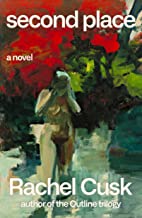Second Place by Rachel Cusk 2021
This new novel by the author of the Outlier trilogy is a peculiar, haunting, and unsettling book. As in the trilogy, the book is narrated in the first person by a woman whose name we never learn and only become aware of her initial ‘M’ in the final two pages. There are three twosomes in this surreal tale, M and her husband, Tony, her daughter Justine and her boyfriend, Klaus, and the famous artist “L” and his girlfriend, Brett. Having survived a mental breakdown and divorce as a young woman at least in part due to her finding an art gallery in Paris where L’s work grounded her and where she developed a fantastic attachment to the idea of L, M is living on a coastal marsh where she and Tony have built a ‘second place’, a guest house where friends and artists/writers are invited to stay. She invites L who arrives with Brett and unleashes a tempestuous series of events and relationships that bring her once again to the brink of madness.
This is a book that merits at least one re-reading. Filled with observations and musings on truth, reality, narrative, fate, love, death—-well, you get the picture. As in her other work, plot is not the foundation for the book, nor is character development the prime mover. The book moves along and moves the reader through the narrator’s thoughts about life and how she arrived at where she finds herself. The final pages contain the following: “The truth lies not in any claim to reality, but in the place where what is real moves beyond our interpretation of it. True art means seeking to capture the unreal.”
Beyond the plot and M’s exploration of her life (fate vs. narrative), there are Cusk’s authorial touches which I find fascinating. First, the story is ostensibly being told to someone named Jeffers who is never identified or commented upon. Is he her analyst, her friend, her lover or is he some imaginary soulmate who M finds more approachable than a real person? And then there’s the writing itself, endlessly flowing in and around the action like the tidal creeks that submerge and reveal the marsh. Her use of alliteration, almost always around ‘s’ is striking: sordid, so small, suburban; serpent, sapping, satisfaction, something. And then, there’s the wonderful cover painting and the title of Second Place, striking a deep chord for me as we build a guest house in Vermont, not with a view over a tidal marsh, but a view over a beautiful mountain. Finally, in a little-noticed touch, the font for this book is unusual in being so fine that I often misread and confused the two primary characters, “L” and “M” because the L looked like an I. I’m pretty sure that this was intentional on Cusk’s part.
Cusk is not for everyone, but if you treasure beautiful writing and wrestle with what it means to be alive and how you got to where you are, this is a great read. Someday, I’ll re-read it and hopefully get even more from it.



